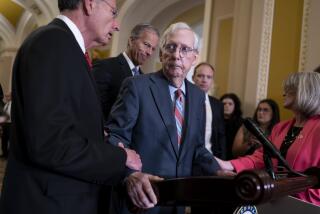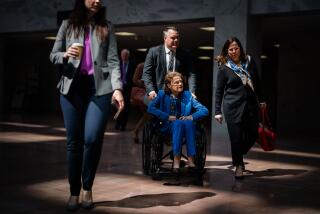Ginsburg Admits Smoking Marijuana in ‘60s and ‘70s
WASHINGTON — Supreme Court nominee Douglas H. Ginsburg issued a statement Thursday admitting that he smoked marijuana on a number of occasions, apparently including the period when he was a member of the Harvard University Law School faculty--an announcement that raises questions about his continued viability as a candidate for the nation’s highest court.
“It was a mistake, and I regret it,” he said.
The marijuana use Ginsburg admitted to--”once as a college student in the ‘60s, and then on a few occasions in the ‘70s”--comes as a particular embarrassment for President Reagan. The President praised Ginsburg when he nominated him as a judge who would be tough on crime. And, along with Mrs. Reagan, the President has made the “Just Say No” anti-drug campaign a focal point of his second term.
In an anti-drug speech he has used on several occasions, for example, Reagan has denounced “the gurus of hedonism and permissiveness” who created “a flippant and irresponsible attitude toward drug use.”
Ginsburg issued his statement acknowledging drug use after it became known that former colleagues on the Harvard faculty had described the episodes to reporters. National Public Radio carried an account of the matter Thursday.
Reagan and Atty. Gen. Edwin Meese III both issued statements reaffirming their support for Ginsburg. But whether the nomination survives “depends entirely on Hill reaction,” a key Administration strategist said after Meese spent several hours meeting with conservative Republican senators.
And initial reaction among the Republican senators who must form the core of Ginsburg’s support varied from non-committal to ruefully critical.
“I don’t know about the facts yet. We’ll have to look into it,” said Sen. Strom Thurmond (R-S.C.), the senior Republican on the Senate Judiciary Committee, which will conduct hearings on Ginsburg’s nomination.
“You like to think people who are appointed to the Supreme Court respect the law,” said Sen. Charles E. Grassley (R-Iowa), a conservative member of the Judiciary Committee.
‘Just Doesn’t Help’
“It certainly doesn’t help. It just doesn’t help,” said Sen. Warren B. Rudman (R-N.H.).
The use of marijuana, while against the law, has been widespread on American campuses for more than two decades. In Ginsburg’s case, however, the seriousness of the issue may be increased by the fact that most of the episodes occurred during his adult life and when he was a law school teacher.
Even before the announcement that Ginsburg used marijuana, conservative supporters had been edging away from the nominee, concerned over the lack of evidence that he shares their beliefs on social issues and because his wife, an obstetrician, performed three abortions as part of her medical training before they were married.
Although Ginsburg did not explicitly say he had used marijuana when he was a professor at Harvard, colleagues on the faculty confirmed that he had.
Drug Use ‘Very Common’
“Like almost everyone his age,” he smoked marijuana “in a social context . . . at parties,” said one colleague who attended such gatherings with Ginsburg. “Among people of that generation, it was very common.”
Nina Totenberg, legal affairs correspondent for National Public Radio, reported moments after Ginsburg issued his statement on the matter that she had interviewed “at least a half dozen of his friends and colleagues who saw him smoking marijuana when he was a professor at Harvard Law School in the 1970s and perhaps in the early 1980s.”
“He on occasion brought the marijuana,” she reported.
Totenberg told the Associated Press later Thursday that after she aired her report, “a source close to Judge Ginsburg called NPR and said that Ginsburg denies that he ever brought marijuana with him. That conflicts with what I was told by others in Cambridge who said that Ginsburg, as a young law professor, kept a stash of marijuana.”
A Criminal Offense
Marijuana use was a criminal offense in Massachusetts at the time Ginsburg lived there, although arrests for simple possession of the drug were rare and the penalties were not severe. Possession of marijuana also was illegal in other jurisdictions in which Ginsburg lived, including the District of Columbia and New York.
Some Republican senators indicated that they would continue to support the nominee. “It’s OK with (Jesse) Helms,” one Administration official said with relief after Meese’s meetings with senators, referring to the conservative North Carolina Republican.
Another conservative, Sen. Gordon J. Humphrey (R-N.H.), called the drug use “disturbing,” but said he regards it as “a youthful indiscretion.” Among conservatives “there will be some” discomfort with the nominee, he said, but “the question is to what degree?” For now, “I don’t see the situation as being serious,” he added.
The most common reaction in the Senate, however--and perhaps the one that tells best the damage the revelations could cause the nominee--was laughter, as some senators joked about the predicament of a conservative President who has crusaded against drugs being in the position of defending a Supreme Court nominee who admits having used them.
Lawmakers’ Quips
Quipped Democrat John Breaux of Louisiana: “He’s starting to sound like one of our candidates.” Other senators joked that the announcement gave “new meaning to the term ‘high court.’ ”
A senior White House official who refused to be identified admitted that “we’ve got a developing problem on life-style issues” that could harm the nomination.
Besides the marijuana use and other previously reported matters, Ginsburg’s mother-in-law, Hallee Morgan of Tenafly, N.J., confirmed Thursday that Ginsburg and her daughter, Dr. Hallee Morgan, lived together at Ginsburg’s home in Cambridge before their marriage.
“The only comment I have is that there are very few young people who haven’t tried that at one time or another,” the elder Morgan said.
Ginsburg’s Divorce
Ginsburg and his first wife split up in 1975, and Ginsburg filed for a formal separation on Oct. 26, 1978. The separations became final in May, 1979, and Morgan moved in with Ginsburg shortly thereafter, according to friends and family. At the time she was completing her medical training at Boston’s Beth Israel hospital.
Ginsburg and his first wife, Claudia de Secundy, were divorced in October, 1980. He and Morgan were married in the spring of 1981.
The issue of Ginsburg’s life style--as well as issues previously raised about his possible violations of government conflict-of-interest rules in connection with a cable television case--also call into question the thoroughness of the review that White House officials made of Ginsburg’s past before they nominated him.
A White House official, speaking on the condition of anonymity, said “there was no indication” in a preliminary FBI report that Ginsburg had used drugs. This preliminary report was made after Ginsburg was named; officials said no FBI check was made before his nomination, apparently because he had been the subject of an FBI inquiry about a year ago when he was nominated for the federal Circuit Court of Appeals.
‘It Did Not Surface’
“Judge Ginsburg was asked the standard question, as all appointees are asked, if there was anything else in their background, but it did not surface,” the official said.
But, asked whether Ginsburg had been asked specifically during his pre-nomination interviews with White House officials if he had used drugs, the official said: “This was not discussed.”
Earlier this week, Justice Department officials appeared to be caught unawares by the conflict-of-interest issue, which involves Ginsburg’s work in the Justice Department on a Supreme Court case affecting the cable television industry at the same time that he owned roughly $140,000 in stock in a cable television company.
Both the stock ownership and the fact that Ginsburg had been deeply involved in the high court case were disclosed in documents Ginsburg publicly filed when he was nominated to the federal appeals court. The Associated Press reported on the potential conflict within two days of the nomination’s announcement.
President Informed
As news of Ginsburg’s admission of marijuana use spread through Washington, White House spokesman Marlin Fitzwater said Reagan had been informed of the situation by White House Chief of Staff Howard H. Baker Jr. and that the President “accepts” Ginsburg’s personal statement.
In August, 1986, Reagan called for mandatory testing of government workers for drugs, including marijuana. The Administration’s own drug-testing program in some cases could lead to sanctions against government workers for marijuana use.
In his statement, Ginsburg said marijuana “was the only drug I ever used. I have not used it since. It was a mistake and I regret it.”
Reagan “stands by his nomination,” Fitzwater said, adding that the President “doesn’t feel that it influences his judicial qualifications.”
Meese, in his statement, said: “I applaud Judge Ginsburg for his forthright statement. As he states, his action, taken during younger days, was a mistake. It certainly does not affect his qualifications to sit on the Supreme Court, and he should be confirmed expeditiously.”
Staff writers James Gerstenzang, Douglas Jehl, Ronald J. Ostrow and Karen Tumulty contributed to this story.
More to Read
Get the L.A. Times Politics newsletter
Deeply reported insights into legislation, politics and policy from Sacramento, Washington and beyond. In your inbox three times per week.
You may occasionally receive promotional content from the Los Angeles Times.












